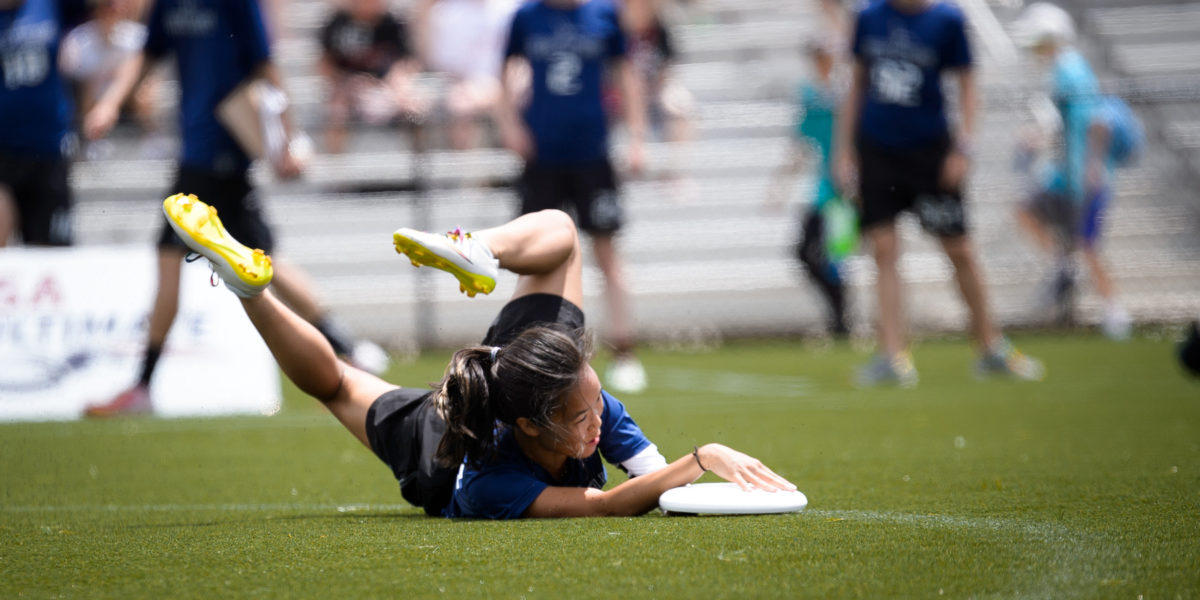 RALEIGH, NC: Whitman College, USA Ultimate D-I College Championships. © Paul Andris for Ultiphotos.
RALEIGH, NC: Whitman College, USA Ultimate D-I College Championships. © Paul Andris for Ultiphotos.
Competitive ultimate is a physically punishing game. Running in cleats on hard ground, laying out for catches and blocks, and colliding with other players are inherent to the sport. During tournaments, six games in a weekend (with three or more played back-to-back) is considered normal. There are also more opportunities than ever to play, increasing the chances to have fun, but also ramping up the physical demands and tolls.
The human body is resilient and adaptable. Given a consistent, reasonable, increasing stimulus and regular time for recovery, the body can adapt to almost any training load. But at every level of ultimate, as competitive opportunities increase each year, the stimulus has become unreasonable for many players.
Consider the National Basketball Association. This year, Dwayne Wade reminded an injured teammate that “if you want to go far in the playoffs, you need to be healthy.” According to ESPN basketball analyst Tom Haberstroh, the NBA’s dense six-month regular season schedule created a storm of injuries that threatened the wellbeing of the league. In February, Haberstroh also wrote about Carmelo Anthony’s game-ending ankle sprain. He attributed it to playing six games in eight nights.
Consider Major League Baseball. Darren Rovell cited research in early 2015 that fewer than nine percent of key players played in a full season of games in 2014. Overwhelmingly, players were out because of injury. MLB seasons frequently include up to three double-header weekends per month for many teams.
Ultimate does not have the NBA’s 75+ game season or the MLB’s 150+ game season. However, density of play in ultimate is similar. For multi-season players, so are the problems.
As a college player, when your season consists of nine six-game tournaments, how do you minimize injuries? If your high school season is ten months of hat league, club mixed, spring league, and summer youth tournaments and two more months of open practices during what should be an off-season, how do you avoid burnout? When you play professional and club ultimate, with two different team strategies to learn and execute each year, how do you perform at a high level?
Injury Prevention
To prevent injuries, make time to rest and make time to build armor.
Making time to rest means taking time completely off from all training after each season. The University of California-Davis Medical Center recommends time off between sports and several months off each year between seasons in one sport. Take at least one week after college nationals and two weeks after club nationals. (If either season ends short of championships, consider it extra rest time!) Making time to rest means skipping extra conditioning from October to December during open college practices. It means running fewer reps than club teammates from May to July. It also means deciding certain tournaments are more important than others.
Making time to build armor means committing two months each year to strength training. According to research by the University of Florida, athletes who avoided the weight room accounted for 64% of severe lower body injuries within high school football. In October and in June, ultimate players should get in the weight room. You build up your calves, thighs, hips, and waist. You lunge, deadlift, and squat heavy weights. You stretch daily. You work on ankle and shoulder flexibility. You do no cardio. You get a little out of shape but you get strong. That strength lays the foundation for an injury-free season.
Avoiding Burnout
To avoid burnout, especially as a young player, remember that absence makes the heart grow fonder.
If you take three weeks off all training each year and spend eight weeks each year in the weight room, you will have plenty of time away to keep the fire burning. You can also simultaneously protect yourself from overuse injury and improve as an athlete by playing a different sport like volleyball or track & field.
John O’Sullivan, commenting on top NCAA football coaches’ recruiting preference for multi-sport high school athletes, wrote that “to be an elite player at a college or professional sport, you need an exceptional degree of athleticism. And the best medically, scientifically, and psychologically recommended way to develop such all around athleticism is ample free play and multiple sport participation…”
Avoiding burnout also applies to the mental strain of competition. By deciding some parts of the season are less critical than others, you give yourself permission to be less focused during them. Play for fun. Celebrate after a solid day of play. Laugh and dance on the field and try risky throws. You should remember the joy of playing ultimate.
Playing Well
To maintain high-level play across different teams with different strategies, learn some sport psychology and take a gamble on your skills.
The mental game of ultimate is still developing. Tiina Booth has been teaching ultimate players to mentally model plays and key situations, to scout opponents effectively, and to visualize perfect execution. At any level of competitive play, you must learn to use positive self-talk about your skills. You must learn to focus on controllable actions when game situations become frantic. Recognize that you cannot truly serve two masters, which means you will inevitably make mistakes on the field. Instead of whipping yourself and assuming your team resents you over them, commit to not making the same mistake in the same situation twice. That mentality will keep you growing as a player.
To play ultimate under different competitive conditions in a dense year, you must make a gamble. Your wager is that your sound throwing, catching, and defensive fundamentals will get you out of sticky situations caused by strategic mistakes. This is the simplest, but hardest of the recommendations in this article. If your fundamentals are not so strong that you would take that bet, hire a coach and improve them.
At the highest levels of baseball and basketball, coaches and players have learned to value rest time in order to prevent injuries. Coaches across college sports know to select resilient athletes with skills from varied sport experiences. Elite players in all sports are investing in psychological strategies in addition to practicing technical skills. To contribute to multiple teams in this punishing sport and enjoy a long playing career, you have to protect, develop, and invest in yourself just as carefully.
Dunte Hector is head strength and conditioning coach at ATX Speed and Strength in Austin, TX. He is the performance coach for Texas Showdown and AUDL’s Austin Sol.









Comments Policy: At Skyd, we value all legitimate contributions to the discussion of ultimate. However, please ensure your input is respectful. Hateful, slanderous, or disrespectful comments will be deleted. For grammatical, factual, and typographic errors, instead of leaving a comment, please e-mail our editors directly at editors [at] skydmagazine.com.